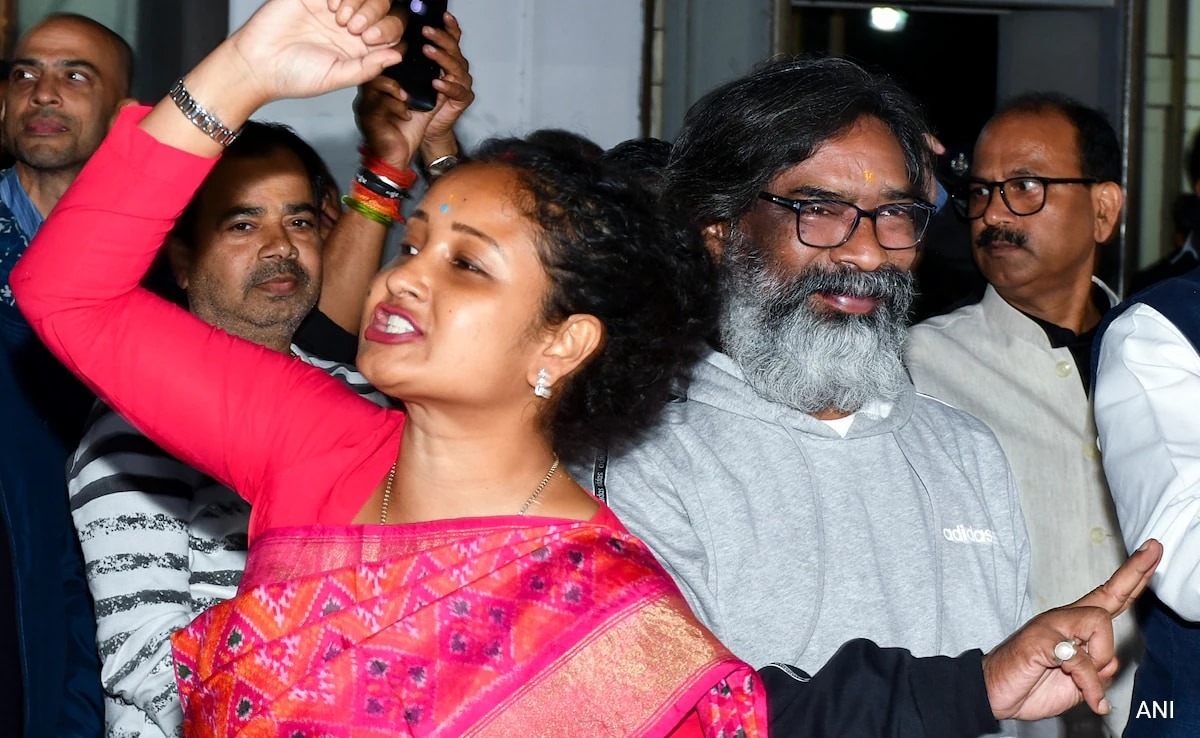
National: After registering a decisive victory in the Jharkhand Assembly elections, Hemant Soren is set to take oath as Chief Minister on Monday, sources said. Mr Soren's Jharkhand Mukti Morcha (JMM)-led alliance triumphed in the polls, setting the stage for him to return as Chief Minister. Despite facing a fierce challenge from the Bharatiya Janata Party (BJP)-led NDA alliance, which mounted an aggressive campaign, the JMM managed to secure 56 seats in the 81-member assembly, far surpassing the BJP's 24.
According to sources, Mr Soren will meet Jharkhand Governor Santosh Gangwar today to stake claim to form the government.
Hemant Soren's Trials, Tribulations
Mr Soren, who had faced political turmoil this year, including a legal battle and an arrest by the Enforcement Directorate (ED), emerged stronger than ever. in the recent polls. The 49-year-old won from the Barhait constituency, where he defeated BJP's Gamliyel Hembrom by a margin of 39,791 votes.
After his release on bail earlier this year, Mr Soren returned to the political fray with renewed vigour. His wife, Kalpana Soren, who played a key role in keeping the JMM ship steady in his absence, won her seat in Gandey with a margin of 17,142 votes.
In a statement following the election results, Mr Soren expressed gratitude to the people of Jharkhand, terming the INDIA bloc's strong showing as a "passing of the exam of democracy." The JMM's victory is widely seen as a reaffirmation of the tribal vote's loyalty to Mr Soren's leadership, despite the best efforts by the BJP to wrest power from the incumbent government.
BJP: Aggressive Yet Unsuccessful
The BJP, led by prominent figures such as Prime Minister Narendra Modi, Union Home Minister Amit Shah, and Assam Chief Minister Himanta Biswa Sarma, launched a high-octane campaign targeting the Soren-led government's alleged corruption and accusations of fostering "infiltration" from Bangladesh. Despite the extensive reach of the BJP's campaign, which included rallies by the party's top brass, the NDA's strategy fell flat, failing to replicate its Maharashtra victory.
The BJP contested 68 seats and secured only 21, with its vote share standing at 33.18 per cent, a figure that was still higher than JMM's 23.44 per cent, but not enough to secure a majority.
The party faced internal bickering, especially regarding nominations for "turncoat" candidates, with several prominent party leaders, such as former BJP members Kedar Hazra and Louis Marandi, switching allegiance to the JMM just ahead of the elections. Some analysts argue that the BJP's inability to project a local tribal leader as the face of its campaign in Jharkhand was a tactical misstep.
JMM's Winning Strategy
The JMM's campaign focused heavily on welfare schemes aimed at addressing the economic challenges faced by the state's rural population. One of the key policies that resonated with the voters was the Maiyan Samman Yojna, a scheme that provides financial assistance to women in the age group of 18-50 years. Initially offering ₹ 1,000 per month, the JMM promised to increase this amount to ₹ 2,500 after the election results.
In addition to this, Mr Soren's government waived farm loans up to ₹ 2 lakh, benefiting over 1.75 lakh farmers. Other populist measures included the waiver of outstanding electricity bills and the introduction of a free electricity scheme for up to 200 units, which particularly appealed to lower-income households.
--Advertisement--

 Desk
Desk Share
Share



